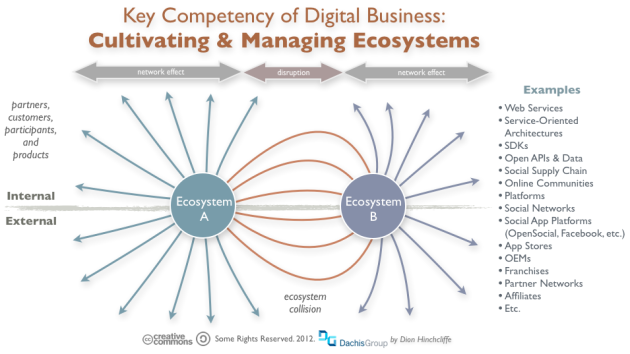Enterprises and Ecosystems: Why Digital Natives Are Dethroning The Old Guard
February 26, 2012 2 Comments
Why is it that so many traditional companies with an enormous wealth of assets largely fail to transform them for the digital era? By assets here, I mean established customer base, closely held relationships with trading partners, mountains of data and IP, as well as their bread and butter, the actual products and services they offer. For large organizations, these assets typically represent many billions in long-term investment and accumulated value that is being stranded beneath a digital ceiling they cannot seemingly break through. The lesson has been a hard one: It’s been surprisingly difficult for many companies to make a genuine transformation to digital.
For those just joining this conversation, this transformation is about opening up and digitally enabling the strategic assets of our organizations for better consumption and participation, with as low a barrier as possible. It’s also means doing so in a way that continually maximizes their value over time in today’s deeply networked marketplace. Achieving this triggers the primary engine of growth for digital ecosystems, namely network effects. This is how Apple, Facebook, Google, Amazon (new guard), and Microsoft, IBM, SAP, Oracle, and many others (old guard) eventually built hundreds of billions in combined value. They tapped into the relevant power laws of networks by carefully and deliberating cultivating and then closely managing them by harnessing peer production over the network.
How exactly was this accomplished? They did it by digitally platforming their businesses in specific ways: Enabling self-service on-boarding, viral adoption, open participation, best-of-breed data capture, ownership and control, and took advantage of the fact that relationships — and therefore, ultimately transactions — must take place on the network with as little friction and cost as possible. They realized that we are now all connected together continuously in a single global network and then designed their organizations around this central fact of the digital age. They are now reaping the results of this mindset:
Networked ecosystems must be a core focus and competency of modern business.
This begs the increasingly urgent question: Why then are a large number of older organizations neglecting their digital ecosystems, often failing to meaningfully cultivate them at all for many of their most valuable assets?
This is a key question that fellow Enterprise Irregular Vinnie Mirchandani recently asked in an internal EI mail thread and later posed on his blog:
But for every Apple which has gone one way, I see so many others piss away this huge asset that is their ecosystem. I hear about musicians and filmmakers auditing, even suing studios for accounting disagreements. I hear SAP mentors complain about legal issues getting licenses and other access to new technology. It’s easy to dismiss Joe Konrath’s litany of complaints against book publishers as one from an unhappy author, but the 230+ comments it has drawn shows a deeper angst about how poorly publishers are managing their author ecosystems.
Ecosystems, communities – call them what you want. They are a vibrant organism which deserve far more ink from all of us. And they need professional managers at the companies at the middle who nourish them and not just treat them as railcars to be hustled away whenever inconvenient.
As companies remain inadequately connected to their customers, partners, and workers via digital ecosystems, many of which they do not control, they are missing a rapidly narrowing opportunity. That’s because it’s very, very hard to disrupt a well-established network effect, which is much more powerful than the equivalent notion in the pre-digital era: traditional market share. Network effects are primary focused on pull distribution, while marketshare is heavily based on push, which is much harder and much more expensive to sustain. As digital natives sew up more and more industries and lay down network effects years ahead of their traditional brethren, any chance to reclaim the throne will be very unlikely.
For leading examples of potent digital ecosystems, see open APIs, social customer care, and app stores.
Why is this? There are a number of reasons but a few are particularly significant. What I wrote in the EI thread in response to Vinnie’s original question was this:
I find that in general, the farther you are from the tech business, the less native skill or familiarity there is with system thinking, which is perhaps the critical capacity to have in order to regard your business in ecosystem terms. This is something that in tech is standard fare with constant discussion and focus on platforms, network effects, SDKs, open APIs, app stores, etc.
Traditional publishers are typical of the technically challenged industries that are being blind-sided by newer, much savvier, techno-centric, network-oriented new digital businesses.
Business leaders that can’t deeply see the way forward for their organizations as flexible, highly dynamic, and organic digital networks of customers, partners, workers, and other (likely and unlikely) participants will ultimately fail. But this isn’t the set of skills or mindset that made them successful in the first place, so they don’t value it and don’t think in these terms. They literally throw off digital rethinking like a sort of corporate immune system. Surprisingly, from my talks in the C-suite the last few years, everyone individually seems realizes they have to change, but collectively they are resistant, it’s fascinating to watch.
A big part of the problem boils down to this: Companies are inherently designed to perpetuate the problem they were invented to solve. It’s a particularly thorny instance of the Innovator’s Dilemma, which ensures that a company is unlikely to aggressively re-invent itself until it’s in the process of being disrupted. Unfortunately, this often means it’s already too late.
In fact, it may be too late for a growing number of industries to fully make the transition to being ecosystem-centric. This includes media, publishing, telecom, retail, and many software companies. Under looming threat is real estate, higher education, financial services, professional services, accounting, and even venture capital. In each of these categories, ecosystem-centric firms are building network effects with open network-based products increasingly built by worker/open communities and delivered to customer communities. Those products are in turn built upon by hundreds or thousands of loyal 3rd party partners to bring their own customers and ecosystems to the table. This is an embarrassment of riches that only a few companies, again mostly digital natives, seem interested or able to tap into.
As Fred Wilson once said, the Web (and therefore digital business) is all about “building networks on top of networks“, which leads to even more powerful outcomes, like 2nd order network effects.
Fortunately, the force multiplier of the ecosystem model can be stated in a simple, fundamental way: It allows one to tap into the vast size and strength of the external network to drive growth, innovation, and revenue for your own ecosystem. As Peter Kim and I wrote in our new book, the fundamental principle of business in the ecosystem era must be to let anyone participate in every aspect of the business, primarily by inverting the facilitation process of driving shared value (i.e. network effects by default.) Being able to elicit the network (Internet, community, shared data, whatever) to maximum effect to fuel and growth your ecosystem is thus the core competency of the digital era. Unfortunately, this lesson is being lost to most organizations that were built well before this next-generation business model was understood. It will be a great loss that doesn’t necessarily have to happen in my opinion, but will ultimately result in the needless disruption of a large number of companies that just aren’t able to become digital natives.
For additional reading see:
4 Ways to Create Sustainable Business Ecosystems
Why Information Power Is The Future of Business
What Will Power Next-Generation Businesses?
A View of Digital Strategy in the Ecosystem Era
Are We Building Businesses Or Are We Building Platforms? Yes.




























































Pingback: Digital Transformation Best Practices | Chief Digital Officer
Pingback: What Most Digital Strategy Underestimates: Scale and Interconnected Change | On Web Strategy | Dion Hinchcliffe